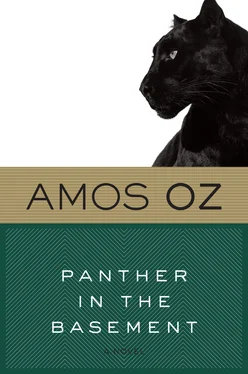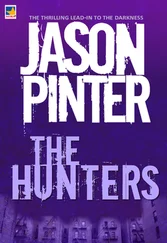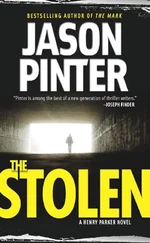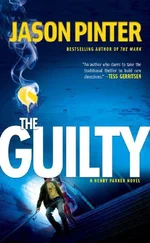I put the book down and turned off the light, because it was almost midnight, but, instead of sleep, thoughts came, and to drive them away I switched on the light again and picked up the book. It didn't help.
That night was deep and wide. Not a cricket's chirp disturbed the curfew. Not a shot was heard. Little by little the submarines in the book turned into submarines made of fog, sailing slowly among banks of drifting fog. The sea was soft and warm. Then I was a mountain child building himself a hut from lumps of fog in the mountains, and suddenly there was a sort of nibbling or sawing at the edge of the hut, as though a stranded whale was scratching himself on the sandy sea bottom. I tried to silence it and I woke up to a sound of shshsh, and opening my eyes I found that I had fallen asleep with my light on and that the shushing sound from the dream had not stopped.
In a flash I sat up in bed, as alert and wary as a robber. There were no death throes, no whale; this was the scratching in the night that I had been waiting for all that summer. A very light but urgent, persistent scratching. It was definitely coming from the entrance, from our front door. It was an injured Underground fighter, who might be dripping blood. We must dress his wound and lay him down in the kitchen on the spare mattress and he must be on his way just before day dawns. What about Father? Mother? Are they asleep? Can't they hear the urgent scratching at the door? Should I wake them? Or open the door myself? They're not here. They're away. There's Yardena, and I promised her on my word of honor not to leave my room. And I remembered how once, when I was nearly ten, she cleaned and dressed a wound I had and I was sorry the other knee wasn't cut, too.
Then came the sound of footsteps, running barefoot along the hallway. The thud of the bolt and the turning of the key in the lock. Whispers. And more footsteps. Rapid low conversation, from the direction of the kitchen now. The scrape of a match on a matchbox. A short rush of water from the tap. And other sounds that it was not easy to identify from where I was, in my bed. Then there was total velvety silence again. Had it all been just a dream? Or was it my duty to get up, break my promise, and go and find out what was going on?
Silence.
Phantom footsteps.
Suddenly the toilet cistern roared. Then the murmur of water rushing along the pipes in the wall. Then more dim voices and bare feet passing the door of my room; that was definitely Yardena whispering to her injured fighter, "Wait a minute, shut up, wait there." Then a grating sound from my parents' bedroom: furniture being moved? A drawer? And suddenly there was a sound of stifled laughter, and perhaps of sobbing, as though under water.
When I am a wounded Underground fighter fleeing hot pursuit, will I also have the strength of character to laugh, like this man, when my wound is being cleaned and treated with a burning, stinging liquid and wrapped tightly with a bandage?
I suspected I wouldn't. And in the meantime the laughter on the other side of the wall turned into a groan and a few moments later Yardena groaned, too. Then more sounds and whispers. And then silence. After a lot more darkness, stray shots started up in the distance, spaced out as though they, too, were tired. And I may have fallen asleep.
The essence of treachery does not lie in the traitor suddenly getting up and leaving the close circle of the faithful. Only a superficial traitor does that. The real, deep-down traitor is the one who is right inside. In the heart of hearts: the one who most resembles and belongs, who is most involved. The one who is most like the others, even more so than the others. The one who really loves the ones he is betraying, because what betrayal is there without love? (I admit this is a complicated matter that belongs in another story. A truly organized man would cross out these lines or transfer them to a suitable story. Nevertheless, I am not going to cross them out. You can skip, if you like.)
That summer came to an end. At the beginning of September we started seventh grade. A new phase began, that of the empty oil drums, from which we tried to construct a subcontinental submarine that could travel freely through the ocean of molten lava under the crust of the earth's surface, from where it could strike without warning and destroy whole cities from underneath, from below their foundations. Ben Hur was appointed captain of the submarine and, as usual, I was his second in command, inventor, and chief designer, and responsible for navigation. Chita Reznik, as ordnance officer, collected dozens of yards of old electric wire, together with coils, batteries, switches, and insulating tape. Our plan was to sail in our submarine to a point beneath the royal palace in London. Chita had a further, private, objective, which was to use the submarine to capture his two fathers, who spent two or three weeks alternately with his mother, and take them away to a desert island. He loved and respected his mother, and he wanted her to have some peace and quiet because in her youth she had been a famous opera singer in Budapest and now she suffered from attacks of melancholy. (Somebody wrote in red paint on their wall: "Chita should be very glad — most kids have only one dad. Gladder still is Chita's mother: first she has one, then the other." Chita scratched the writing with a nail, scrubbed it with soap, painted over it, without success.) In Bible class Mr. Zerubbabel Gihon taught us about how the Babylonian beasts conquered Jerusalem and our temple and razed them to the ground. As usual he joked at his wife's expense: if Mrs. Gihon had lived in Jerusalem in those days, the Babylonians would have escaped by the skin of their teeth. He took the opportunity to explain the expression "the skin of their teeth."
My mother said:
"There's a little girl at the institution, an orphan called Henrietta. Must be five or six. Covered with freckles. She suddenly started calling me Mamma, not in Hebrew, in Yiddish, and she tells everybody I'm her mother, and I can't make up my mind what I ought to do: whether I should tell her I'm not her mother, that her mother's dead — but how can I kill her mother for the second time? — or not react, wait for her to get over it. But then what about the other children's jealousy?"
Father said:
"That's difficult. From a moral point of view. Either way someone will suffer. And think of my book: who will read it? They're all dead."
I didn't find Sergeant Dunlop at the Orient Palace. I looked for him again after the festivals, three times; I still couldn't find him. Not even when the autumn came and low clouds enfolded Jerusalem to remind us that not everything in the world is summer and submarines and underground fighters.
I thought: Maybe he's found out through a complex network of informers and double agents that I was betraying him. That I told Yardena about him and she told her wounded fighter that night, and he told the Underground, and they may have kidnapped him. Or the opposite: Maybe the CID was shadowing us when we met and Sergeant Dunlop has been imprisoned for treason, and maybe because of me he has been removed from his beloved Jerusalem and banished to some far-flung outpost of the Empire, to New Caledonia, New Guinea, or perhaps Uganda or Tanganyika?
What did I have left? Only a little Bible in Hebrew and English that he gave me. I still have it. I couldn't take it to school, because it contained the New Testament, which Mr. Gihon said was an anti-Jewish book (but I read it, and I found, among other things, the story of the traitor Judas).
Why didn't I write to Sergeant Dunlop? First of all, he didn't leave me an address. Second, I was afraid that if he got a letter from me it might get him into worse trouble and they might punish him more. Third, what did I have to say to him?
Читать дальше












